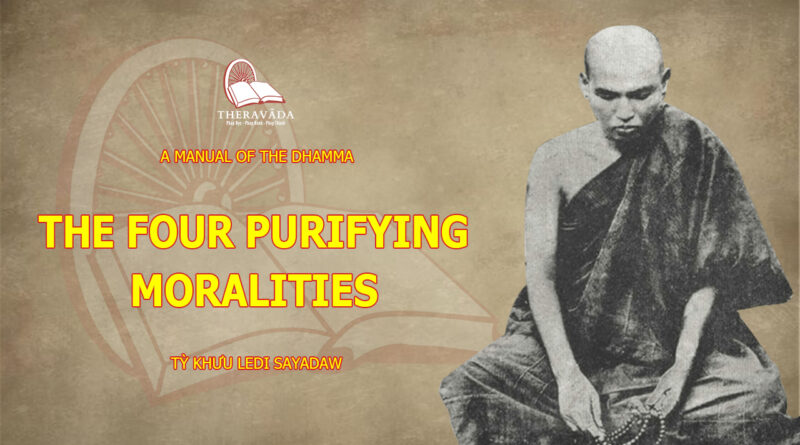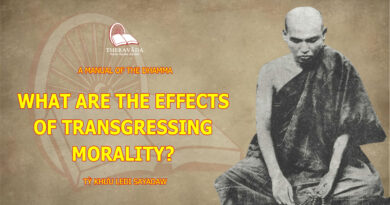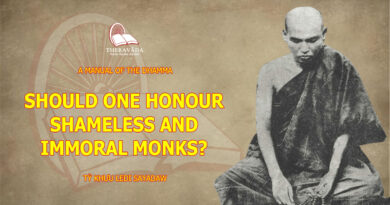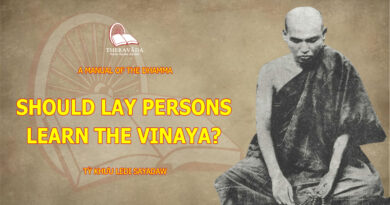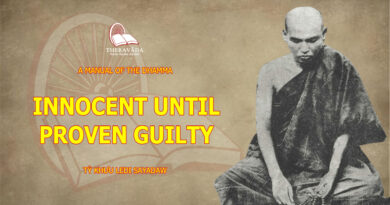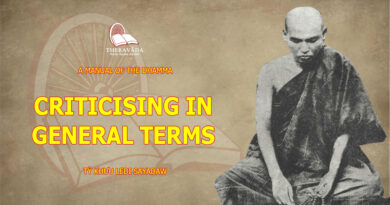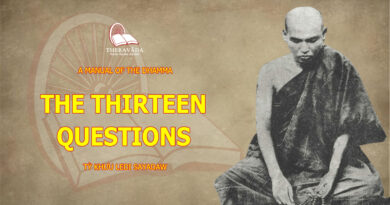Nội Dung Chính [Hiện]
The Four Purifying Moralities
“Kindly give the detailed factors or characteristics of each of the four purifying moralities (pārisuddhi sīla). You may give each its characteristic, function, manifestation, and proximate cause.”

 1. Pātimokkha Restraint
1. Pātimokkha Restraint
A monk who is an ordinary person is liable to fall into offences, and he must confess his offence with the determination to avoid it in future. The purity of restraint is re-established by this act of purification, and protects the monk against future misdeeds. In curing his offences, a monk sincerely promises, “I will not do this again.” This decisive mind must be present during confession.

 2. Sense Faculty Restraint
2. Sense Faculty Restraint
The above two factors also co-exist in the morality of sense-faculty restraint — guarding the six sense-doors. To purify the faults in the matter of sense-faculty restraint is very subtle and difficult. One must use mindfulness at the six sense doors to get moral restraint and moral purification.

 3. Two Factors of Livelihood Purification
3. Two Factors of Livelihood Purification
- Not accepting or using unallowable food and other requisites. Only allowable food and requisites must be accepted according to the Vinaya rules.
- If unlawful food and things are accepted due to ignorance, a monk must quickly purify his guilt by suitable Vinaya procedure mentioned in the texts, then purity of livelihood is restored. Curing this kind of offence involves the abandonment of unlawful things and making a confession. In some cases, where breaking purity of livelihood does not amount to an offence, a monk must abandon the unlawful things, making a determination to observe restraint in the future.
In the sphere of observance of this morality there are three aspects: acceptance of four lawful requisites according to Vinaya rules, using them conscientiously, using them within the allowable time limit.

 4. Morality Concerning Requisites
4. Morality Concerning Requisites
A monk must reflect when using food, robes, dwellings, and medicines with the above three factors. Wise reflection should be practised so that a skilful attitude and clear comprehension arise. To practise morality is difficult and profound. Why? By using a rosary, a monk normally reflects wisely on the four requisites, thus purity of this morality is gained. One might therefore think that this is easy. However, mere counting of beads and recitation of good words and thoughts are not sufficient to fulfil this morality. Mere awareness or correct mindfulness on the four requisites, though necessary, is not enough. For a monk, subtle attachment or clinging to robes, food, and dwellings are difficult to eradicate, despite recitations, counting of beads, and right thoughts. A monk needs very strong mindfulness and insight to abandon this subtle craving. So whenever he uses the four requisites he must develop the power of consideration to the full with complete awareness. Only when the four types of attachment cease, is this morality satisfactorily attained. Purity is obtained on the use of things after strenuous noble efforts. Hence customary counting of beads and mere verbal repetition cannot fulfil this morality. He must concentrate on the full meaning and significance of the Pāḷi texts for the arising of clear knowledge. If this knowledge fails to arise, morality concerning requisites is not attained. Lacking this deep insight, four types of attachment prevail in the heart.
One can know whether this morality is attained or not by observing the behaviour of a monk. A monk who attains this moral purity has no attachment or greed. He will not accumulate possessions, wealth, or property. He will not exhibit attachment to lay supporters. He will live in any type of monastery, in every season, under difficult conditions. He will accept rag robes, alms food, dwellings under a tree, and putrid medicines, all of which were highly praised by the Buddha, though they are coarse types of simple living. If a monk chooses and selects only good monasteries, eats only good food, hopes for only good dwellings, and longs for them, he fails to achieve this sublime morality, and is impure in this respect. So a monk must know the factors leading to the attainment of this important morality and practise vigorously and systematically to get the necessary factors of achievement.

